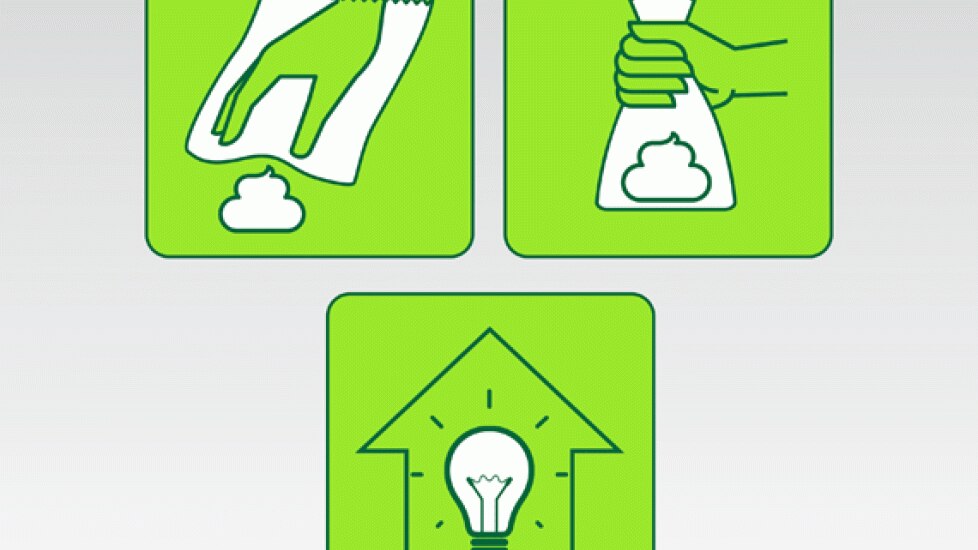Your Dog's Poop Can Energize Your Home
Unlike most students, I did not make the decision to go to veterinary school because of an overwhelming need to help animals. This is not to say I don’t love animals, it is just that I had a different motive. I needed a career that would provide the necessary income so I could develop simple, alternative sources of clean energy for households in developed and undeveloped countries. I wanted to turn household waste, human waste, and pet waste into methane gas to supply household energy. It appears I was 40 years ahead of my time.
A Swiss designer in Geneva has built a convertor that harvests methane gas from dog poop. The gas is then used to generate electricity that is stored in batteries and used in household appliances. The concept has the same simplicity I had imagined.
So how does it work? Why and how did I decide to go to vet school and eventually get side-tracked from alternative energy development?
Methane Conversion
Most of us take flushing the toilet for granted. Our waste, with a substantial amount of water to make flushing practical, leaves our toilets and is routed through underground pipes to sewage treatment plants. This was not always so, and still isn’t in many areas. Many homes still have underground septic tanks in their yards to collect waste and water from toilets, sinks and wash machines. These tanks contain bacteria that break down the waste and produce methane gas. This gas is not captured but released into the air.
At sewage waste plants the methane gas is burned by their “eternal flame” to reduce the odor that is characteristic of the gas. My plan was to design a capture system for septic tanks and even sewage plants to generate electricity or burn directly for gas appliances. Many hog and dairy farms are presently doing just that to power their homes and sell energy to electric companies.
The technology has even helped in developing countries where poor households collect human and animal waste in plastic bags. Bacteria ferment the waste, creating methane gas in the bag. The bag can then be connected to “camp stove” like burners to prepare daily meals.
This simplicity was captured by the Swiss designer Océane Izard, who designed the Poo Poo Power conversion device. Dog poop is deposited into an elegant, artistic convertor containing the poop eating bacteria. The methane is converted to power that is stored in detachable batteries used to run small appliances, like battery operated lights, fans, vacuums etc. The amount of energy produced depends on the amount of poop your dog produces, or the amount you collect from other dogs. Izard estimates that a German shepherd produces enough poop to keep a refrigerator running.
The potential for this technology is unlimited. According to Adele Peters, the author of the story featuring this invention, Paris, France, cleans up 12 tons of dog poop from its streets daily. She also reports that U.S. dogs produce about 10 million tons of poop each year. You can see why I was excited those 40 years ago about the possibilities.
Why I Chose Vet School Over Alternative Energy
My background in science made me contemplate which careers would pay enough to support my energy research endeavors. Human medicine was the obvious first choice.
In the 1970s, doctors were one of the highest paid professionals. But the eight years of school, internships, and residencies was more than I wanted to commit. Also, I reasoned the cost of malpractice insurance, and the risk of malpractice suits, was much too high. I had no interest in dentistry, so veterinary medicine it was. In the '70s, veterinarians were also doing quite well, and when parvovirus broke out in the early '80s it was even better.
But as I was studying, the industry was changing. City zoning rules made working out of the home impossible, and opening a practice required a larger investment. Brick and mortar facilities all have built-in infrastructures needs that also require large operating costs. And the most important thing I didn’t factor in was the time needed daily to practice good medicine, own a hospital, and raise a family. As these all became my primary focus, my desire to save the environment through methane technology waned. I found that I was good at medicine and concentrated on perfecting those skills, especially in the field of nutrition. I feel I have made a difference in the lives of my patients and their owners, so I don’t regret my decision.
It is merely that stories about alternative energy remind me of why I went to vet school, and I thought I might share that personal journey with you.
*
What do you think — would you use a Poo Poo Power machine to convert your dog's waste into energy for your home? How much would you be willing to pay for such a device? Share your thoughts in the comments.

Dr. Ken Tudor
Image: Composite: elenabsl, Rinika25, Aleksandrs Bondars / Shutterstock
Related
How Green is Your Dog's Poop? Shining a Light and Finding a Solution to Pet Waste
